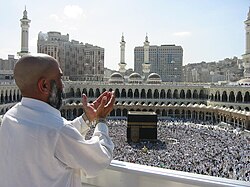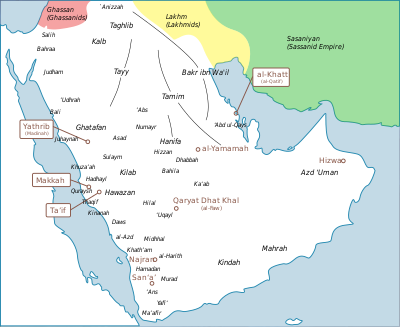Kinana
This article may need to be rewritten to comply with Wikipedia's quality standards. (October 2010) |
This article includes a list of general references, but it lacks sufficient corresponding inline citations. (June 2013) |

Banu Kinanah (also Bani Kinanah) (Arabic: بنو كنانة) (Arabic: بني كنانة) are the largest Mudhari Adnanite tribe of western Saudi Arabia in Hejaz and Tihama. They are descended from Kinanah, who was a grandson of Ilyas.
Kinanah (or Kinana) was an ancestor of the Islamic prophet Muhammad.
Abu Muhammad 'Abd al-Malik bin Hisham wrote: Muhammad was the son of 'Abdullah, b. 'Abdu'I-Muttalib (whose name was Shayba), b. Hashim (whose name was 'Amr), b. 'Abd Manaf (whose name was al-Mughira), b. Qusayy (whose name was Zayd), b. Kilab, b. Murra, b. Ka'b, b. Lu'ay, b. Ghalib, b. Fihr, b. Malik, b. aI-Nadr, b. Kinanah, b. Khuzayma, b. Mudrika (whose name was 'Amir), b. Ilyas, b. Mudar, b. Nizar, b. Ma'add, b. Adnan, b. Udd (or Udad),....b. Ya'rub, b. Yashjub, b. Nabit, b. Ishmael, b. Ibrahim (Abraham), the friend of the Compassionate.[1]
Branches

Banu Kinanah are divided in four branches: An-Nadr, Abdumanat, Malakan, and Malak.[citation needed]
An-Nadr ibn Kinanah
An-Nadr is Quraysh, the 13th grandfather of Muhammad An-Nadr is the son of Kinana.
Abd manaf ibn Kinanah
This is one of the biggest branches of Kinanah, and his sons are Murrah, Bakr, Alharith.
Banu Laith, Banu Dhumrah, Banu Ghufar, Banu Jadhimah, Banu Mudlij, Banu Aldiil, and Banu Sho'bah are the descendants of Abdumanat.
Malak (Malik) ibn Kinanah
Ban Firas ibn Ghanam ibn Thaalabah ibn Alharith ibn Malak ibn Kinanah were the best warriors of all.
Malakan ibn Kinanah
He is the first man to be named Malakan, and his sons are Haram, Thaalabah, Saad, Ausaid, and Ghanam.
Related tribes
References
- ^ Ibn Ishaq (1955). The Life of Muhammad: A Translation of Ibn Isḥāq’s sīrat. Translated by Alfred Guillaume. London. p. 3. ISBN 0195778286.
{{cite book}}: CS1 maint: location missing publisher (link)
- Smith W. Robertson, Kinship and marriage in early Arabia
- A universal history, from the earliest accounts to the present time
- George Sale (translator) and Savary (illustrator), The Koran, Commonly Called the Alcoran of Mohammed
- Francesco Gabrieli and Salvator Attanasio, A Short History of the Arabs
- John Walter Jandora, The March from Medina
- Muhammad Zafrulla Khan, Muhammad
- D. S. Margoliouth, Mohammed and the Rise of Islam
- Andrew Crichton, History of Arabia, Ancient and Modern
- Kinanah tribe, kinanah.net Template:Ar icon
- http://www.thearabhistory.com/mudar
- http://sirah.al-islam.com/tree.asp?ID=1&t=book2
- http://sirah.al-islam.com/Display.asp?f=rwd1012
- http://sirah.al-islam.com/Display.asp?f=rwd1014
